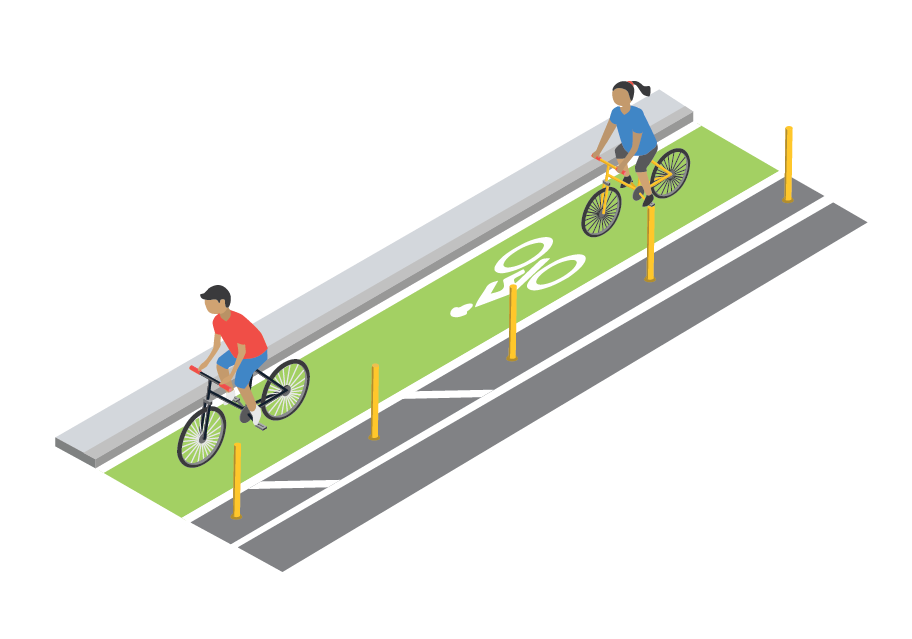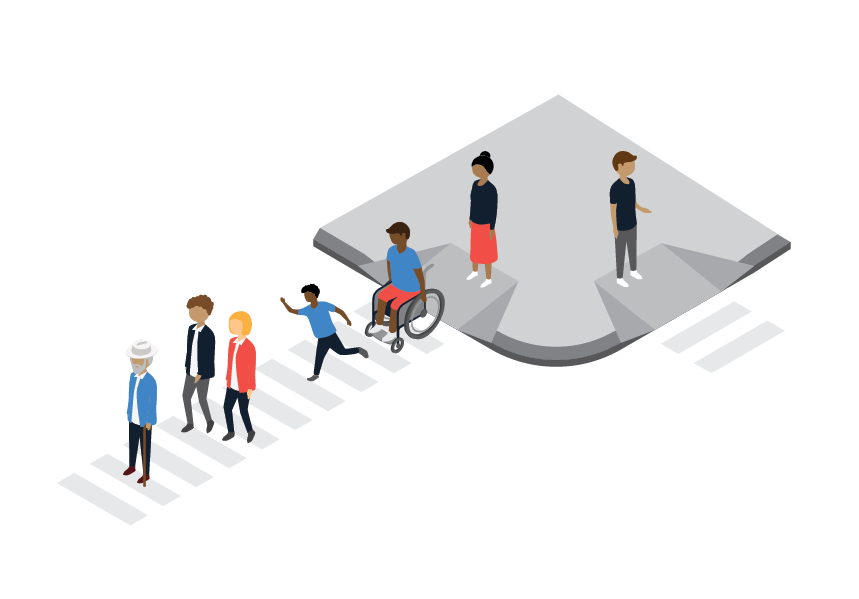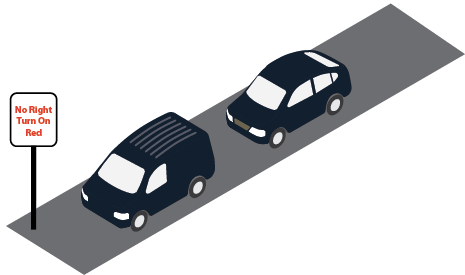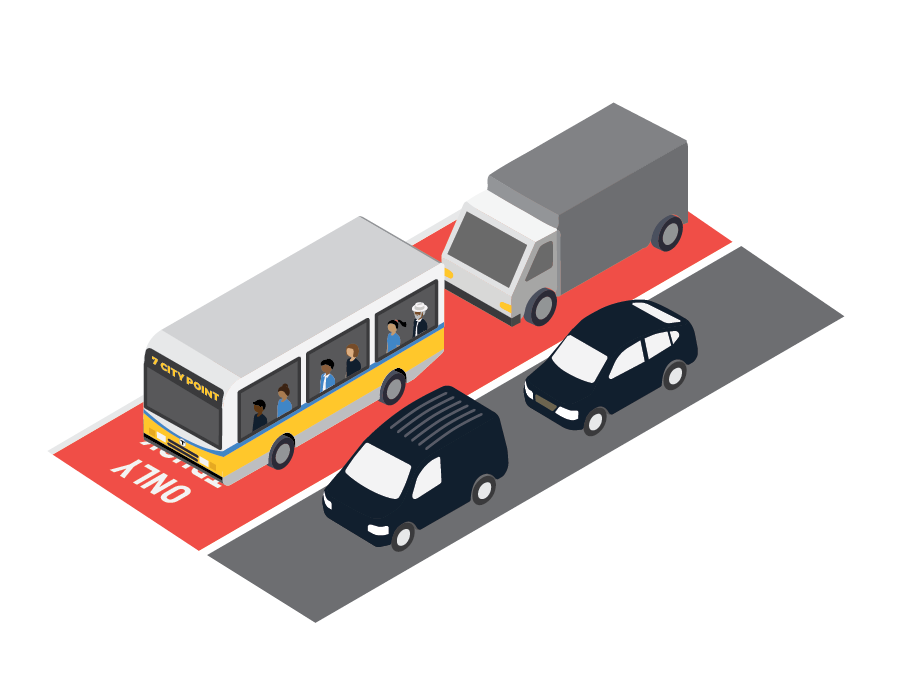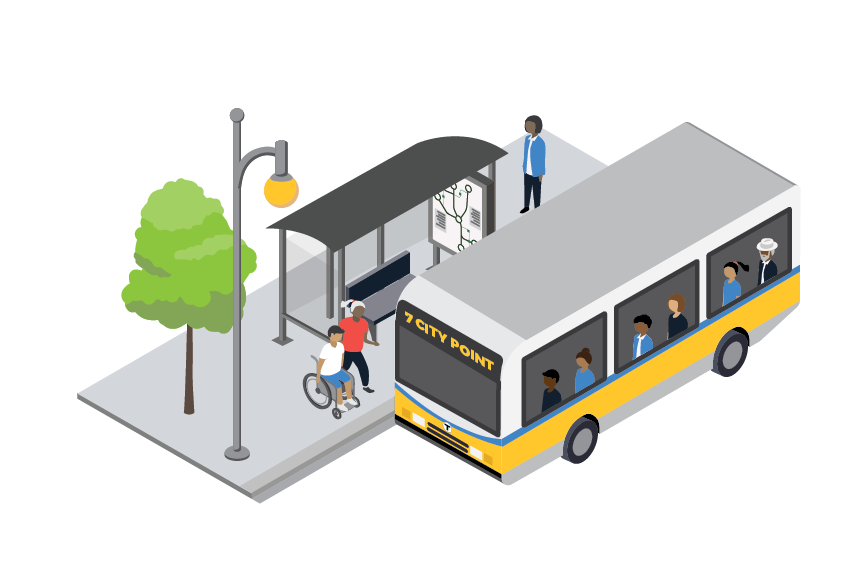Summer Street Pilot Program
We launched a pilot bus and truck lane program on Summer Street between South Station and South Boston on December 4, 2023. This project includes bus and truck lanes, better bike lanes, and improvements to pedestrian infrastructure.
The Summer Street Pilot has ended and we are ready to report on the results. We appreciate all those who participated in this process including members of the community, elected officials, and key stakeholders. Based on community feedback and a comprehensive review of pilot data, we are discontinuing the bus/truck lane.
Protected Bike facilities and some signal changes, including bicycle phases and longer pedestrian crossing phases, implemented as part of the pilot will remain in place. The Summer Street Pilot successfully encouraged more people to bike, providing a better bike connection between South Boston and Downtown. Signal changes brought Summer Street into compliance with federal guidelines, allowing people of all ages and abilities to safely cross Summer Street. Bicycle and pedestrian safety is key to creating a Summer Street that sustainably and efficiently accommodates economic growth.
Through the Bus Network Redesign, we anticipate a much higher volume of bus traffic on Summer Street in the future, and we are now prepared to move quickly when bus frequencies and ridership increase to a level that supports a dedicated bus lane. Bus lanes are one tool in our toolkit to connect our neighborhoods, and the City will continue to prioritize bus lanes on streets with high bus ridership and where an extensive evaluation has determined the need for these treatments. We look forward to continuing the conversation with residents and all other community stakeholders in the future.
Final Report
The Summer Street Pilot launched December 4, 2023 to improve mobility, safety, and connectivity along Summer Street between South Station and East First Street in South Boston. The pilot included a dedicated bus/ truck lane, protected bike lanes, and signal timing changes to improve walkability and traffic operations. A pilot approach allows the City of Boston Streets Cabinet and Massachusetts Bay Transportation Authority (MBTA) to evaluate roadway changes, collect feedback, and iterate on the design before identifying a preferred, long-term configuration.
The Summer Street Pilot was an important first step for supporting sustainable growth in the fastest growing neighborhood in Boston and soon to be the second largest employment hub. With additional transit service coming to Summer Street as part of the MBTA Bus Network Redesign, refining the corridor cross-section and bus/truck lane design to further reduce transit and truck travel times and address operational challenges remains a priority. In the short term, the bus/truck lane pilot will end, reverting to two general-purpose travel lanes in each direction. The Streets Cabinet will re-engage the South Boston community when MBTA service frequency improves and will conduct another community process at that point.
Read the Full Report and Appendix Documents.
Summary of Near-term Post-Pilot Changes
Protected bike lanes (no change)
The pilot enhanced existing bike lanes and added bike connections where they were missing to provide an all, ages, and abilities bike connection. The protected bike lanes are here to stay with minimal to no changes to the current configuration.
Exclusive pedestrian and bicycle phases (no change)
Signal timing prior to the pilot was non-compliant with federal standards (MUTCD and ADA) and federal policies. Changes to lengthen the crossing time and provide additional walk time will remain in effect unless Streets reduces crossing distances through treatments like curb extensions or bus bulbs at bus stops.
No right on red (no change)
As bike and pedestrian volumes increase along Summer Street with new development, safety is imperative.
Dedicated bus/ truck lane (remove and reevaluate at a later date)
Remove bus/truck lane and return to general travel lane between Dorchester Avenue and East 1st Street.
Enforcement of Transit Priority throughout the City
Continue to explore policy mechanisms for automated enforcement and explore posts and rumble strips design options to discourage bus lane violations
Summer Street Bus/Truck Lanes FAQs
FAQsWhy is the City discontinuing the bus/truck lane on Summer Street?
What measures will remain in place on Summer Street after the pilot?
Even though the bus/truck lane is being discontinued, key safety measures implemented during the pilot will remain. These include protected bike facilities and signal changes, such as bicycle phases and longer pedestrian crossing times, which are designed to enhance safety for cyclists and pedestrians.
What were the outcomes of the Summer Street Pilot?
The Summer Street Pilot successfully encouraged more people to bike, creating a better, safer connection between South Boston and Downtown. The signal changes made during the pilot brought Summer Street into compliance with federal guidelines, improving safety for people of all ages and abilities.
What changes to signage and striping can we expect on Summer Street in the coming weeks?
The City will update the signage and road striping on Summer Street to remove the bus/truck lane and keep the protected bike facilities and pedestrian safety measures. These changes will include removing or covering old signs related to the bus/truck lane, updating directional signage, and re-striping lanes to improve clarity and safety for all road users.
This will begin in the next few weeks and be phased to minimize disruption. The exact schedule will depend on weather conditions and other project coordination. We expect it will take several weeks to complete. There may be minor traffic disruptions to complete the work. Signs will also be posted on Summer Street ahead of any major changes to keep the public informed about any parking disruptions.
How will these changes improve safety and traffic flow on Summer Street?
The updated signage and striping will help clarify lane usage, reduce confusion, and improve overall safety for drivers, cyclists, and pedestrians. By clearly marking bike lanes and pedestrian crossings, the City aims to create a safer and more organized traffic environment on Summer Street.
Who can I contact if I have questions or concerns about the changes?
If you have any questions or concerns about the signage and striping changes on Summer Street, please contact 311. With any other questions about the Summer Street pilot, please contact transit@boston.gov
Will the City consider adding a bus lane on Summer Street in the future?
When the MBTA's Bus Network Redesign leads to a substantial increase in bus traffic, the City will evaluate transit priority options. The pilot has provided the necessary groundwork to act quickly when higher bus frequencies and ridership levels support the need for a dedicated bus lane.
What are the City’s goals in promoting transit priority measures like bus lanes?
The City aims to create a vibrant, equitable, and connected city through transit priority measures. These measures make buses more reliable and promote a more sustainable and resilient city. Bus lanes also reduce travel times for riders, saving hours of valuable time. For example, the N Washington St bus lane reduced travel times for bus riders by 25%. By prioritizing public transit, the City supports transit-dependent populations, reduces travel times, and improves connections between neighborhoods, particularly those that have been historically underserved.
Why was a pilot chosen for Summer Street instead of a permanent bus lane installation?
A pilot was chosen for Summer Street due to the complex environment, including the Port of Boston’s operations and significant traffic from the Convention Center and large hotels. The pilot allowed the City to test the effectiveness of the bus/truck lane in real-world conditions, gather data, and adjust based on outcomes and stakeholder feedback.
When is a pilot necessary for transit priority measures?
A pilot is necessary when there is uncertainty about how a transit priority measure, such as a bus lane, will function in real-world conditions or when additional data and community feedback are needed. Pilots are particularly useful in complex environments or when introducing new treatments, like the mixed bus/truck lane on Summer Street.
When might a permanent installation be more appropriate than a pilot?
A permanent installation might be more appropriate when there is strong evidence supporting the transit priority measure, either from successful projects in similar areas or from comprehensive modeling and analysis. If the expected benefits are clear, and a pilot's temporary nature could cause confusion without providing meaningful insights, moving directly to a permanent solution may be more efficient.
Background
The Summer Street Pilot was a recommendation of the BPDA’s South Boston Seaport Strategic Transit Plan (SBTAP) which passed the BPDA Board in December 2023. Community feedback and data in the study highlighted the need for near-term improvements along Summer Street to improve transit, bikes, and pedestrian trips in the near-term. Summer Street also must be improved for the long-term future to accommodate growth from development projects and an increase in port activity.
Other efforts that contributed to the Summer Street Pilot included:
- Recommendations from the South Boston Sustainable Transportation Plan that encouraged more multimodal improvements to the South Boston Waterfront/Seaport District.
- Go Boston 2030 which highlighted the need for bike accommodations on Summer Street.
- Feedback from MassPort about the importance of Summer Street as a freight corridor.
Through this Pilot, we studied the experience of thousands of daily transit users, cyclists, pedestrians, and vehicle operators on Summer Street with new bike facilities and a pilot bus and truck lane program.
Project Documents
DocumentsThis folder contains quantitative data and community feedback collected during the 2024 Pilot Period. We will be actively adding to this folder as we continue to consolidate data and conduct community engagement.
Presentation of the Summer Street Pilot Open House/Community Meeting held at Tynan Elementary School on July 8, 2024.
Recording of the Summer Street Pilot Open House/Community Meeting held at Tynan Elementary School on July 8, 2024.
Recording of the Street Open House/Community Meeting held virtually via Zoom on June 14, 2024.
Presentation from the Summer Street Open House/Community Meeting at the 105 by Breakthrough on June 11, 2024.
Poster Boards from the Summer Street Open House/Community Meeting at the 105 by Breakthrough on June 11, 2024.
This flyer summarizes the pilot project's location, start date, potential impacts, and implementation process.
These infographics highlight current conditions throughout Summer Street and the evaluation metrics that will be used to measure the Pilot Project.
This brochure summarizes project goals, evaluations, and potential impacts.
Presentation from the Summer Street Open House/Community Meeting at the Tynan School in South Boston on April 19, 2023.
These plans highlight new pavement markings and street signage that will be implemented in the pilot stage of the Summer Street redesign.


